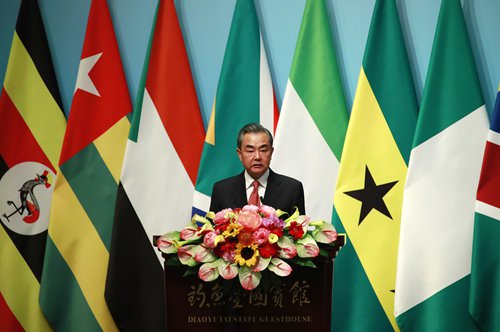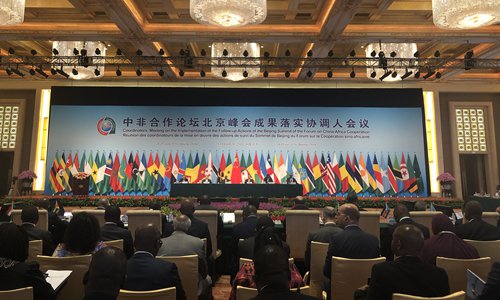HOME >> CHINA
China, Africa boost relations
By Li Ruohan and Yu Jincui Source:Global Times Published: 2019/6/25 23:18:40 Last Updated: 2019/6/25 23:59:53
Trade surges despite challenges in international markets

Chinese State Councilor and Foreign Minister Wang Yi delivers a speech at the Coordinators' Meeting on the Implementation of the Follow-up Actions of the Beijing Summit of the Forum on the China-Africa Cooperation at the Diaoyutai State Guesthouse in Beijing, on Tuesday. Photo: IC

Ministers from China and African countries attend the opening ceremony of Coordinators' Meeting on the Implementation of the Follow-up Actions of the Beijing Summit of Forum on China-Africa Cooperation on Tuesday. Photo: Li Ruohan/GT
Cooperation with China is "beneficial" and yields visible results that empower African countries to realize sustainable growth, amid the challenges of unilateralism and protectionism, senior officials said on Tuesday.
The remarks were made by Chinese and African ministers gathered in Beijing for the Coordinators' Meeting on the Implementation of the Follow-up Actions of the Beijing Summit of Forum on China-Africa Cooperation (FOCAC) from Monday to Tuesday. More than 80 African ministerial-level officials attended the meeting.
In a congratulatory letter to the meeting of the FOCAC, Chinese President Xi Jinping said that the 2018 Beijing Summit of the FOCAC was a milestone in the history of China-Africa relations, the Xinhua News Agency reported.
Xi said he hopes the two sides will use the meeting as an opportunity to make solid progress in pushing for the implementation of the FOCAC Beijing Summit's achievements and to constantly improve the welfare of 2.6 billion people in China and Africa.
Despite severe challenges in international markets, China-Africa trade increased 3 percent year-on-year to $84.8 billion in the first five months of the year, and China's direct investment to Africa surged 20 percent year-on-year to $1.5 billion, Chinese Vice Commerce Minister Qian Keming said at a press conference after the meeting on Tuesday.
Qian said that efforts to implement the eight major initiatives proposed during the Beijing Summit are yielding results that are benefiting people on both sides.
Agreements worth $20 billion covering the investment, infrastructure and agriculture sectors have being signed, Qian said.
Participants from Africa at the meeting told the Global Times on Tuesday that there has been a big increase in China-Africa exchanges and cooperation since the Beijing Summit, with projects being delivered with strong momentum.
The recent signing of over 93 agreements between companies in South Africa and China shows the effect of cooperation such as FOCAC, Naledi Pandor, South Africa's Minister of International Relations and Cooperation, told the Global Times.
"Part of the role of the coordinating ministers is to actually assess where we are with the undertakings that all of us agreed to, and to ensure that we do not convert FOCAC into a discussion forum, but that it becomes a true platform for development," said Pandor.
Model for cooperation
Every country has the right to develop, and people from China and African countries are firmly dedicated to achieving the Chinese Dream and the African Dream via their own endeavors and through international cooperation, Chinese State Councilor and Foreign Minister Wang Yi said at the opening ceremony of the coordinators' meeting on Tuesday.
China-Africa cooperation is a model of South-South cooperation. However, some outside forces have maliciously slandered and obstructed the cooperation with fabricated narratives of it being akin to neocolonialism or miring countries in debt traps, Wang said.
Those false statements fully contradict the facts, show no respect to African nations and no understanding of China, said Wang. "Only African people have the biggest say about whether the cooperation with China is good or bad."
Sarah Serem, Kenyan Ambassador to China, said on the sidelines of the meeting that the cooperation with China has "changed the face of Kenya."
"There's a lot of development going on and we are benefiting from this relationship," Serem said. Infrastructure projects between China and Kenya have not only boosted trade and investment, but also enhanced people-to-people connectivity in Kenya, she noted.
The building of the Mombasa-Nairobi standard gauge railway (SGR), a flagship project of the China-led Belt and Road Initiative (BRI), has driven Kenya's economic growth by 1.5 percent and created 46,000 jobs for local residents, Xinhua reported in May.
Since the launch of the railway in 2017, with an average booking rate of 99 percent, over 2.77 million passengers have traveled on the SGR, and around 4.2 million tons of goods have been transported.
"China has never sought to occupy any African country, and its interest has been developing partnerships which seek to address the key priorities of African countries," Pandor said.
"A colonial power would occupy a country and seek to direct its institutions of governance and business. There's been no such practice by China and it can only be [coming from] those who envy the cooperative relationship that China has built with Africa," Pandor said.
Ben Botolo, secretary for foreign affairs and international cooperation of Malawi's Ministry of Foreign Affairs, stressed that China is not seeking political influence, but "doing business" which is good for the people in the continent.
He said that the country is discussing signing a memorandum of understanding with China on the BRI, and that it hopes to join the initiative soon.
So far, 40 African countries and the African Union Commission have signed BRI cooperation agreements with China, and more than 880 projects on China-Africa cooperation will be carried out in the next three years, Wang said.
Posted in: DIPLOMACY